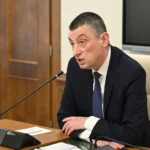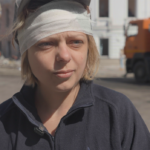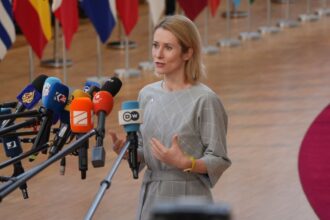Ukraine continues to dig deep in order to create safe spaces for birth and learning. This includes underground schools in Kharkiv and maternity wards based in shelters in Lviv. In Kherson Oblast, children’s play areas have been created.
The Russian war has given Ukrainians two options: either adapt to the new realities, or degrade. Ukraine has chosen to develop and has gone underground in order to protect its future.
The opening of a perinatal centre and educational spaces in shelters throughout the country marks a significant step in Ukraine’s efforts in providing crucial services during the war.
Lviv Regional Perinatal Center renovates shelter for safe deliveries
The Lviv Regional Perinatal Center announced that it would be setting up delivery, operating and hospital rooms within its shelter in April 2024 so that Ukrainian babies could enter the world safely.
“In the underground shelter at the Lviv Regional Clinical Perinatal Center a scaled down perinatal is now operating!” It is spread over 700 square meters and includes operating rooms, delivery rooms, intensive care units and post-intensive care unit.
He pointed out that this basement facility was used only for domestic purposes before the war began. The ceiling height was only 1,5 meters, which limited its use. The shelter was deepened over a meter as part of the renovation.
During the reconstruction of the building, nearly 125 truckloads were excavated. It upgraded the sewage system, fire suppression system and ventilation, and installed internet access. Kozytskyi said that all renovations are in compliance with state building standards and safety, accessibility, as well as accessibility.
The funding for the innovative perinatal centre within the shelter came in many forms. The Kozytsky Charity Foundation held an auction and raised over $51,000. Amdos Management and Vodafone Ukraine also donated, as did the regional budget and the perinatal centre itself. Over $400,000 was needed to reconstruct the underground shelter.
Kherson’s underground children’s corners and libraries
Ukraine has opened underground spaces for kids in two settlements of Kherson Oblast that were liberated from the forces of Moscow. Oleksandr PROKUDIN, the head Kherson Regional Military Administration, said that the children of Ukraine can play and learn in these special corners located in Chornobaivka or Myroliubivka while hiding from Russian drones and missiles. He says that there are 13 playground shelters like this in the region.
“Persistent Russian air raid sirens, and devastating Russian attacks. Children in Kherson Oblast are forced to grow up in harsh conditions due to Russian aggression. Residents of the region are now spending many hours in shelters. It is a difficult time for children, said Prokudin.
According to him efforts are being undone to create children’s spaces within other shelters in order to provide them with an enriching and safe environment.
Prokudin says that Ukraine carefully plans these shelters to ensure children are not bored underground. The shelters are equipped with books, comfortable furniture and a variety of toys. They offer engaging activities for children of all ages.
According to Suspilne, volunteers in Kherson, the central city of the region, have launched a “Book Shelter” program that allows children to participate in performances, read literature, and draw.
“In Kherson it is difficult to think of the future, particularly for children. This creative activity helps children define their dreams and goals for their lives. It’s a visualization activity: When a child redraws the pages, they can see what they want to achieve in the future,” says librarian Oleg, who is a volunteer for the project.
One of the parents who has a child at the shelter says that those who take part in the Book Shelter Project prefer to listen fairy tales and learn interesting facts about animals and nature.
“At this moment, we are solely focused on books because it was our original project. In the future, we will try other activities with the children, because there is no real child-tochild interaction,” says Marina Chizhova.
Chizhova says that the volunteers are planning to open 30 more book shelters in Kherson.
Kharkiv’s school curriculum has new depths
A large number of Kharkiv’s schoolchildren are studying remotely because of the Russian military aggression. Ukraine’s authorities established “subway school” in five metro stations of the city nearly six months ago. Children are taught valuable lessons. The lessons have been successful, as parents of children who attend the classes have not switched to remote education.
Ihor Terekhov announced recently the establishment of a Kharkiv underground school. This is another way to keep students together, and to provide them with a place where they can advance their social interaction.
The school is designed to accommodate 450 students per shift. This means we will be able to teach 900 pupils. We’ll start off with 300-350 students because both teachers and pupils need time to adapt,” said the Mayor.
UkrInform reports that the school staff has noted the ventilation and air recovery system, and two entrances or exits, which are essential for the safety and security of children in the face of Russian missile attacks.
The underground building contains 20 classrooms, as well as a medical unit and a mini cafeteria. It also has restrooms. The school will order and distribute meals to the children at specific times. Only tea is available on site.
Classes have already been formed with a maximum of 20 students per class. The majority of students are younger than school age, according to the head of the educational establishment in Kharkiv district.
“Many families have returned with their children to the city. “There is already a need for offline education,” Olha Vynnyk said, the director at Lyceum No. 157.
According to her, the children will attend class in two shifts on alternate days. This means a combination of offline and online education to engage more students.
The underground school in Kharkiv Source: Ukrinform
“Following sanitary regulation, younger students will receive three lessons while senior students will receive four.” She said that online classes would be held every two days, and some subjects would be taught only remotely.
Ihor Terekhov had previously stated that Kharkiv planned to build more underground school in all nine districts. The city authorities have set a deadline of 1 September 2024 for the completion of three more facilities.
Please read:
Kharkiv Metro was converted into an underground school to save children from having to seek shelter every time there is an alert
Due to Russian attacks on critical infrastructure, over 215K Kharkiv residents are without electricity
* Russia’s rumored attack on Kharkiv – assessing the threat
* Zelenskyy says Ukraine needs more Patriot systems for Kharkiv and other cities
After Russian attacks on energy infrastructure, Dnipro authorities evacuate hospitals and close schools
Read More @ euromaidanpress.com













